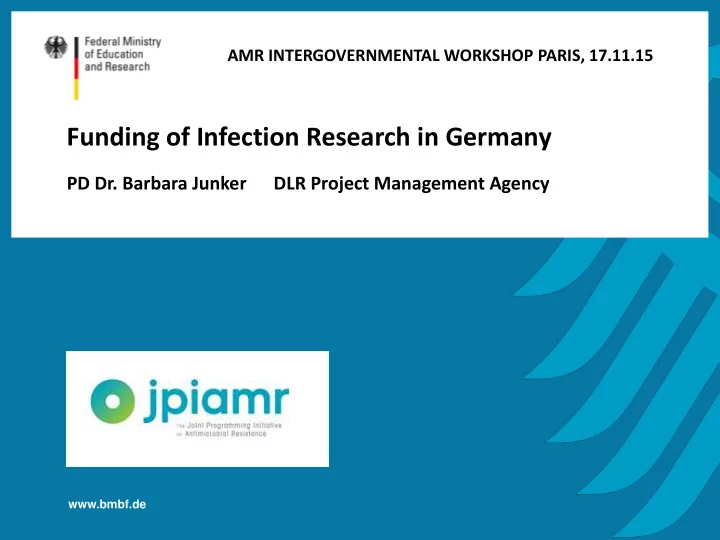

AMR INTERGOVERNMENTAL WORKSHOP PARIS, 17.11.15 Funding of Infection Research in Germany PD Dr. Barbara Junker DLR Project Management Agency www.bmbf.de
Research Funding in Germany German Research Foundation (DFG) (project funding) Universities (main financial support from the Länder ) Helmholtz Association (90% FG: 10 % Länder ) Max Planck Society (50 % FG: 50 % Länder ) Leibniz Association (50 % FG: 50 % Länder ) Fraunhofer Society (33% FG and Länder , 66% contract research) Federal Government Federal States – Länder Federal Research Institutes Project funding Project funding (RKI, PEI, FLI etc.) Institutional funding Institutional funding Institutes of the Länder Paris, 17.11.2015
Health Research Framework Programme of the Federal Government Health Research (2013: 252 Mio € ) Biomedical Research (2013: 128 Mio. € ) http://www.bmbf.de/en/healthresearch.php implemented by Federal Ministry of Education and Research (BMBF) Paris, 17.11.2015
Challenges and Fields of Action 1. The structural challenge: Focussed research into major diseases 2. The research challenge: Individualised medicine 3. The prevention challenge: Research into prevention and nutrition 4. The system challenge: Research into health care 5. The innovation challenge: The health care industry 6. The global challenge: International cooperation in health research Paris, 17.11.2015
Combating diseases – the idea behind the German health research program The aim is to provide improved medical treatment in order to enhance people's quality of life Closer networking of expertises, disciplines and institutions will ensure the quick translation of research results into medical care Large structural funding measures include the German Centers for Health Research Paris, 17.11.2015
The German Centers for Health Research Overview Six German Centers for Health Research have been launched according to the major diseases: cancer cardiovascular diseases diabetes infectious diseases lung diseases neurodegenerative diseases Strategic aim is to bring together the best university and non-university partners across Germany German Centre for German Consortium for Cardiovascular Research Translational Cancer Research German Centre for German Centre for Infection Research Diabetes Research Paris, 17.11.2015 German Centre for German Centre for Lung Research neurodegenerative diseases
The German Centers for Health Research Intention Translation – the guiding idea Short Term: Integrate knowledge and join forces in infection research Integrate research infrastructures and facilitate access to cohorts Establish new career paths with a focus on translation Middle Term: Increase the number of clinical trials Provide novel research infrastructures to the community Facilitate industry co-operations (one-portal, common IP-management) Long Term: Provide more efficient prevention, diagnosis and treatment strategies and reduce number of deaths by infections Novel comprehension of translational research through new generation scientists, i.e. Clinical Scientists Paris, 17.11.2015
German Center for Infection Research Key Figures The German Center for Infection Research… … was founded 2012 … consists of seven partner -sites comprising 35 research groups … possesses twelve associated members … has had a budget -increase from 16 Mio. € (2013) to 39 Mio. € (2015) … will be funded with an annual budget of 39 Mio. € starting 2015 – 90 % are provided by the Federal Government and 10 % are provided by the Federal States (Länder) as permanent, institutional funds in a joint effort Paris, 17.11.2015
German Center for Infection Research Paris, 17.11.2015
Health Research Framework Programme The global challenge: International cooperation in health research Create synergies for medical progress across borders Networking of research funders, researchers, and infrastructures through: ERA-nets, JPIs, EDCTP, ESFRI Informal cooperations, e.g. with ANRS Paris, 17.11.2015
DART 2020 The German Antimicrobial Resistance Strategy National strategy in line with the WHO global action plan Ministries of Health, Food and Agriculture, and Education and Research Goals: • Strengthening the One Health approach nationally and internationally • Recognising changes in resistance at an early stage • Retaining and improving therapy options • Breaking chains of infection early and avoiding infections • Raising awareness and strengthening skills • Supporting research and development Paris, 17.11.2015
Research on Zoonoses Research Agreement between • Federal Ministry for Education and Research • Federal Ministry of Health • Federal Ministry of Food and Agriculture • Federal Ministry of Defence German Research Platform for Zoonoses • The German Research Platform for Zoonoses is an information and service network. The objective of the platform, which now has over 500 members, is to increase the exchange of experiences at national and international levels and thus intensify research activities in the field of zoonoses research, promoting broad horizontal cross-linking of human and veterinary medicine. “A melting pot for zoonoses researchers .” Paris, 17.11.2015
Research on Zoonoses Funding of the platform, research consortia, single projects, work shops by the 3 Ministries ca. 80 Mio. Euros spent from 2007 – 2017 New calls are planned to be announced in 2015 Paris, 17.11.2015
ESBL and (fluoro)quinolone Resistance in Enterobacteriaceae • To determine the prevalence of ESBL-producing bacteria in humans (hospital, ambulant, community), animals (livestock, pets), food and the environment • To identify the respective resistance genes and analyse their transferability between enterobacteriaceae • To compare genetic relationship of bacterial isolates and resistance gene carrying plasmids in different settings (human, animal, environment) to evaluate the transmission pathways of ESBL-resistance Paris, 17.11.2015
MedVet‐Staph: Interdisciplinary Research Network on the Zoonotic Impact of Staphylococcus aureus/MRSA • To identify the risk MRSA which emerged in livestock and companion animals • To identify the contribution of clinically relevant antibiotic resistance genes contained by staphylococci from animals to antibiotic resistance development in staphylococci of human • To further develop targeted antibiotic resistance surveillance as well as strategies for diagnostics, intervention, and therapy as one health approach. Paris, 17.11.2015
Project Management Agency within the German Aerospace Center Ressources • 960 employees • 1,22 Mrd. Euro funding/y • more than 10,000 projects/y • Locations at Bonn, Köln, Berlin Bilder: PT-DLR, DLR, Getty Images, Thinkstock, Lufthansa, Schenker AG, EU Kommission, Stand: 12/2012 Foto|Edhar – fotolia, GTAG.net Fotomontage: PT-DLR Paris, 17.11.2015 Paris, 17.11.2015
Thank you for your attention! Paris, 17.11.2015 Paris, 17.11.2015 17
Recommend
More recommend